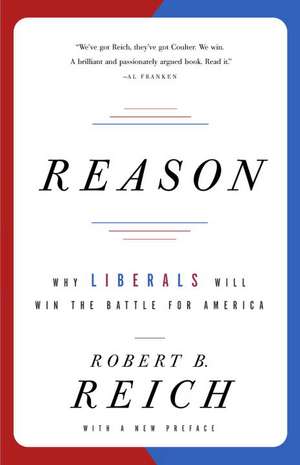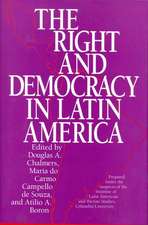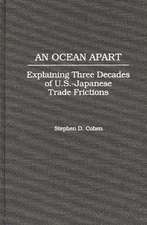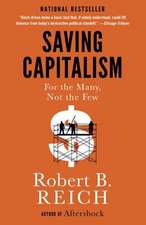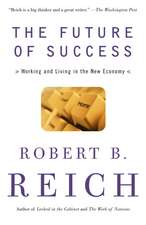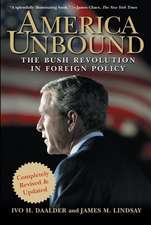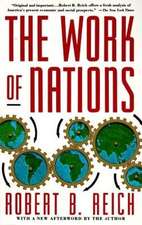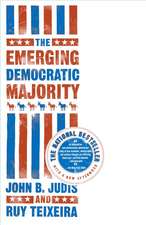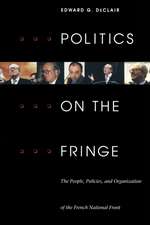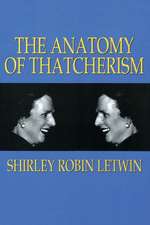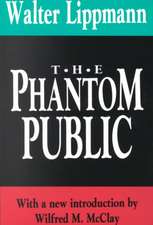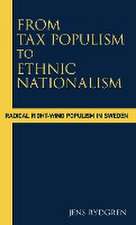Reason: Why Liberals Will Win the Battle for America
Autor Robert B. Reichen Limba Engleză Paperback – 30 apr 2005
To do so, Robert B. Reich shows how liberals can:
.Shift the focus of the values debate from behavior in the bedroom to malfeasance in the boardroom
.Remind Americans that real prosperity depends on fairness
.Reclaim patriotism from those who equate it with pre-emptive war-making and the suppression of dissent
If a single book has the potential to restore our country’s good name and common sense, it’s this one.
Preț: 93.19 lei
Nou
Puncte Express: 140
Preț estimativ în valută:
17.83€ • 18.53$ • 14.81£
17.83€ • 18.53$ • 14.81£
Carte disponibilă
Livrare economică 13-27 ianuarie 25
Preluare comenzi: 021 569.72.76
Specificații
ISBN-13: 9781400076604
ISBN-10: 1400076609
Pagini: 272
Dimensiuni: 145 x 195 x 15 mm
Greutate: 0.2 kg
Editura: Vintage Publishing
ISBN-10: 1400076609
Pagini: 272
Dimensiuni: 145 x 195 x 15 mm
Greutate: 0.2 kg
Editura: Vintage Publishing
Notă biografică
Robert B. Reich is University Professor at Brandeis University and Maurice B. Hexter Professor of Social and Economic Policy at Brandeis’s Heller Graduate School. He is also a visiting professor at the University of California at Berkeley. He served as secretary of labor under President Bill Clinton. His writing has appeared in The New Yorker, The Atlantic Monthly, the New York Times, the Washington Post, and The Wall Street Journal. This is his tenth book. He lives in Cambridge, Massachusetts.
From the Hardcover edition.
From the Hardcover edition.
Extras
Chapter One
Prelude: The Revenge of the Radcons
Wealth and Power
It might help you to know a few things about me so that you understand where I’m coming from. I was born in Scranton, Pennsylvania, and grew up in a rural part of New York State, near the Connecticut border. My father worked six days a week and my mother five days a week at their two clothing stores. We weren’t poor, but I remember my father worrying a lot about paying the bills. Another thing you should know is I was very short for my age. I still am. Both my parents were normal size, so my short height was something of a puzzle. But being a very short boy, it was natural I got picked on at school.
There’s no way of proving these things, but I suppose my early worries about paying the bills and being bullied had a few long-term effects. As an adult, I’ve been teaching and writing about the economy and government—that is, about wealth and power. I’ve also had the honor of serving under three presidents, most recently in Bill Clinton’s cabinet. In these roles I’ve tried to help people without much money get better jobs, and also tried to stop some corporations from abusing their power.
The market is where wealth is accumulated; politics is where public power is exercised. In a democracy, they are supposed to be kept separate. But in fact, people with a lot of wealth exert significant political power, and people with a lot of power can arrange things so that they end up with a lot of wealth. When wealth and power are concentrated in a relatively few hands, democracy can become a sham and a lot of bullying can occur. The great liberal Supreme Court justice Louis Brandeis put it best more than sixty years ago: “We can have democracy in this country or we can have great wealth concentrated in the hands of a few, but we cannot have both.”1 We are now losing our democracy, and we have to get it back.
I never used to think of myself as being a liberal. Compared to most students in the sixties, I was considered pretty conservative. I went to Dartmouth College, whose political epicenter in those days was about 25,000 miles to the right of Berkeley.
I rejected a lot of the values and politics of the student New Left of the sixties. Taking over college buildings and burning American flags seemed dumb to me. I viewed the Vietnam War as morally wrong but never drifted into the cynicism or anti-Americanism of some of my leftist friends, who started spelling America with a “k.” I always believed it possible to reform the nation by working within the political system—and still do. I spent much of my senior year campaigning for Eugene McCarthy, by then the only presidential candidate who vowed to end the war. And I’ve spent a big portion of my life since then in public service. While I’ve never refrained from criticizing our political leaders when I thought they were wrong, I’ve always had a deep love for this country. To me, America is a great, noble, continuing experiment. We haven’t achieved our ideals by a long shot. But the ideals are still worth working for: protecting the weak from the strong, overcoming prejudice, providing broad opportunity to everyone, creating a vibrant democracy.
My first full-time job after law school was working for Robert Bork at the Justice Department, in Gerald Ford’s administration. Bork, you may remember, was the person who fired the special prosecutor, Archibald Cox, during the Watergate investigation. Cox had been trying to get the White House to hand over tape recordings of conversations that would show if Richard Nixon was involved in the Watergate break-ins. Nixon finally handed over the tapes anyway, on August 5, 1974. He knew their contents would condemn him. Four days later, Nixon resigned. A few weeks after that, I arrived in Washington and reported to Bork.
Bork had been one of my professors at law school. I didn’t share his political views but I respected him. So when he asked me to come to Washington, I accepted. My job was to write briefs on behalf of the United States in cases that were to come before the Supreme Court. I stayed two years before moving to the Federal Trade Commission, after Jimmy Carter was elected president. Bork went on to become one of the most thoughtful radical conservatives in America. You may recall that in 1987 Ronald Reagan nominated him to the Supreme Court, setting off an intense battle over his confirmation. I quote Bork at some length in this book because his writing has been so influential among radical conservatives. I still disagree with him, but I still respect him.
It’s possible to disagree and yet still be respectful. I strongly disagree with, but know and respect, several of the radical conservatives I quote in this book—not only Bork but also Bill Bennett, a former Reagan administration official who has become the Radcon voice of public morality; Bill Kristol, the editor of the Weekly Standard, who has articulated much of Radcon foreign policy; and Newt Gingrich, the former Speaker of the House. Their ideas deserve a fair hearing, and a clear case should be made for why they are dangerously wrong.
In the sixties (a period that in political and cultural terms actually ran from about 1964 to 1972), the New Left was the source of most of the political passion and intensity in America. Liberals were considered wimps—wishy-washy, bourgeois. The militant organizer Saul Alinsky adopted the definition of a liberal as someone “who leaves the room when a fight begins.”
Now it’s hard to find any sixties lefties, except maybe in the rarefied precincts of a few universities where aging radicals still debate Marxism and deconstruction. Most of the political passion and intensity these days are on the radical conservative right.
But the two extremes—what remains of the sixties left, and the Radcons—share much of the same sense of moral superiority, the same unwillingness to consider alternative points of view.* There’s an important difference, though: The left never gained the power in America that the Radcons now have.
In my view, both extremes are wrong. Liberals, on the other hand, doubt that anyone has a monopoly on the truth. That’s why liber- als place such a high value on tolerance and democracy. That’s why liberals have insisted on a clear separation between church and state. And it’s also why liberals worry about wealth and power. When wealth and power become concentrated in the hands of a rela- tively few citizens, the strong become stronger; everyone else, more vulnerable.
The word “liberal” was used by George Washington to indicate a person of generosity or broad-mindedness, as opposed to those who wanted to deprive Catholics and Jews of their constitutional rights.2 Franklin D. Roosevelt defined a “liberal” this way: “[S]ay that civilization is a tree which, as it grows, continually produces rot and dead wood. The radical says: ‘Cut it down.’ The conservative says: ‘Don’t touch it.’ The liberal compromises: ‘Let’s prune, so that we lose neither the old trunk nor the new branches.’ ”3 FDR himself expanded and altered the common understanding of liberalism. Before the New Deal, liberalism was mostly about protecting people’s freedom.
* Even some of the individuals are the same: A few lefties from the sixties transported their moral absolutism to the radical right in the late seventies and eighties and became “neoconservatives.” The term is generally applied to those who moved from far left to far right, but for the purposes of this discussion, I include them together with other Radcons.
But the Great Depression taught America that unemployment and bad luck could be just as harmful to personal freedom as tyranny. Protection against these required a larger role for government.
Henceforth, liberals were assumed to be in favor of a big government. But that’s way too simple. The government’s size or reach isn’t the issue. It’s what government does and whose interests it represents. Does it guard our civil liberties or intrude on our privacy? Does it protect the weak or promote the strong? I don’t want a big government eavesdropping on my private telephone calls or e-mail, checking the books I’ve borrowed from the library, monitoring my movements, telling me what I can and can’t say. I don’t want a big government pouring billions of dollars into big companies—energy behemoths, agribusinesses, pharmaceutical giants, whatever—because they’ve made large political donations. And I don’t like the idea of a giant military machine mounting “preemptive” wars without international backing. I don’t want a big government that’s the center of an intimidating, unaccountable empire.
Being a liberal isn’t at all the same as being in favor of big government, despite what Radcons claim. Most liberals would prefer a small government that supported and protected the little guy over a big government that did the bidding of the wealthy and powerful. Frankly, people I know are more worried that our democracy is being corrupted by an increasing flow of campaign money from rich people and corporations to politicians. I also don’t want a big government imposing any particular religious view on me or my kids, or on anyone else. In my view, government has no business telling people how to run their private lives or dictating personal morality. I don’t want government giving or withholding funds to promote marriage, discouraging childbearing by welfare mothers, or pushing religion in our public schools.
Again: Government’s size isn’t the issue. It’s what it does, and for whom.
radcons aren’t real conservatives
Here, briefly and in its most undiluted form, is the Radcon agenda for America:
• prevent sex before marriage
• ban abortion
• condemn homosexuality
• prohibit gay marriage
• require prayer in the public schools
• give large tax breaks mainly to the rich
• cut social services mainly for the poor
• “privatize” social insurance
• eliminate regulations on business
• allow pollution of the environment
• ban affirmative action
• impose long prison sentences and, for the most serious crimes, the death penalty
• make English the official national language
• invade and occupy countries that may harbor or help terrorists
• go it alone in foreign affairs, disregarding the United Nations and avoiding international treaties
• squelch dissent about foreign policy
• restrict civil liberties for the sake of national security.
Most open-minded Americans will grant that there are arguments for and against each of these positions. What defines a Radcon is not openness to the case for them but fervent certainty they’re correct and necessary, and disdain for those who disagree.
This list, of course, doesn’t cover all radical conservative goals. And not every radical conservative subscribes to every one of them. But most radical conservatives agree on most. The consensus among Radcons is strong because these goals are based on a common worldview—both about the forces America is battling at home and abroad, and about how these forces can best be overcome.
Most of this book is about why these views are wrong, what a vigorous liberalism stands for instead, and why our future depends on the latter. But it’s important at the outset to understand the roots of radical conservatism. Radcons, it must be noted, are very differ- ent from real conservatives. A real conservative is somebody like the late Senator Robert A. Taft, of Ohio, or Senator John McCain, of Arizona—someone who wants to conserve many of the things that are great about America: the value we place on hard work, our dedication to family and community, our love of freedom, our storehouse of generosity and tolerance.
From the Hardcover edition.
Prelude: The Revenge of the Radcons
Wealth and Power
It might help you to know a few things about me so that you understand where I’m coming from. I was born in Scranton, Pennsylvania, and grew up in a rural part of New York State, near the Connecticut border. My father worked six days a week and my mother five days a week at their two clothing stores. We weren’t poor, but I remember my father worrying a lot about paying the bills. Another thing you should know is I was very short for my age. I still am. Both my parents were normal size, so my short height was something of a puzzle. But being a very short boy, it was natural I got picked on at school.
There’s no way of proving these things, but I suppose my early worries about paying the bills and being bullied had a few long-term effects. As an adult, I’ve been teaching and writing about the economy and government—that is, about wealth and power. I’ve also had the honor of serving under three presidents, most recently in Bill Clinton’s cabinet. In these roles I’ve tried to help people without much money get better jobs, and also tried to stop some corporations from abusing their power.
The market is where wealth is accumulated; politics is where public power is exercised. In a democracy, they are supposed to be kept separate. But in fact, people with a lot of wealth exert significant political power, and people with a lot of power can arrange things so that they end up with a lot of wealth. When wealth and power are concentrated in a relatively few hands, democracy can become a sham and a lot of bullying can occur. The great liberal Supreme Court justice Louis Brandeis put it best more than sixty years ago: “We can have democracy in this country or we can have great wealth concentrated in the hands of a few, but we cannot have both.”1 We are now losing our democracy, and we have to get it back.
I never used to think of myself as being a liberal. Compared to most students in the sixties, I was considered pretty conservative. I went to Dartmouth College, whose political epicenter in those days was about 25,000 miles to the right of Berkeley.
I rejected a lot of the values and politics of the student New Left of the sixties. Taking over college buildings and burning American flags seemed dumb to me. I viewed the Vietnam War as morally wrong but never drifted into the cynicism or anti-Americanism of some of my leftist friends, who started spelling America with a “k.” I always believed it possible to reform the nation by working within the political system—and still do. I spent much of my senior year campaigning for Eugene McCarthy, by then the only presidential candidate who vowed to end the war. And I’ve spent a big portion of my life since then in public service. While I’ve never refrained from criticizing our political leaders when I thought they were wrong, I’ve always had a deep love for this country. To me, America is a great, noble, continuing experiment. We haven’t achieved our ideals by a long shot. But the ideals are still worth working for: protecting the weak from the strong, overcoming prejudice, providing broad opportunity to everyone, creating a vibrant democracy.
My first full-time job after law school was working for Robert Bork at the Justice Department, in Gerald Ford’s administration. Bork, you may remember, was the person who fired the special prosecutor, Archibald Cox, during the Watergate investigation. Cox had been trying to get the White House to hand over tape recordings of conversations that would show if Richard Nixon was involved in the Watergate break-ins. Nixon finally handed over the tapes anyway, on August 5, 1974. He knew their contents would condemn him. Four days later, Nixon resigned. A few weeks after that, I arrived in Washington and reported to Bork.
Bork had been one of my professors at law school. I didn’t share his political views but I respected him. So when he asked me to come to Washington, I accepted. My job was to write briefs on behalf of the United States in cases that were to come before the Supreme Court. I stayed two years before moving to the Federal Trade Commission, after Jimmy Carter was elected president. Bork went on to become one of the most thoughtful radical conservatives in America. You may recall that in 1987 Ronald Reagan nominated him to the Supreme Court, setting off an intense battle over his confirmation. I quote Bork at some length in this book because his writing has been so influential among radical conservatives. I still disagree with him, but I still respect him.
It’s possible to disagree and yet still be respectful. I strongly disagree with, but know and respect, several of the radical conservatives I quote in this book—not only Bork but also Bill Bennett, a former Reagan administration official who has become the Radcon voice of public morality; Bill Kristol, the editor of the Weekly Standard, who has articulated much of Radcon foreign policy; and Newt Gingrich, the former Speaker of the House. Their ideas deserve a fair hearing, and a clear case should be made for why they are dangerously wrong.
In the sixties (a period that in political and cultural terms actually ran from about 1964 to 1972), the New Left was the source of most of the political passion and intensity in America. Liberals were considered wimps—wishy-washy, bourgeois. The militant organizer Saul Alinsky adopted the definition of a liberal as someone “who leaves the room when a fight begins.”
Now it’s hard to find any sixties lefties, except maybe in the rarefied precincts of a few universities where aging radicals still debate Marxism and deconstruction. Most of the political passion and intensity these days are on the radical conservative right.
But the two extremes—what remains of the sixties left, and the Radcons—share much of the same sense of moral superiority, the same unwillingness to consider alternative points of view.* There’s an important difference, though: The left never gained the power in America that the Radcons now have.
In my view, both extremes are wrong. Liberals, on the other hand, doubt that anyone has a monopoly on the truth. That’s why liber- als place such a high value on tolerance and democracy. That’s why liberals have insisted on a clear separation between church and state. And it’s also why liberals worry about wealth and power. When wealth and power become concentrated in the hands of a rela- tively few citizens, the strong become stronger; everyone else, more vulnerable.
The word “liberal” was used by George Washington to indicate a person of generosity or broad-mindedness, as opposed to those who wanted to deprive Catholics and Jews of their constitutional rights.2 Franklin D. Roosevelt defined a “liberal” this way: “[S]ay that civilization is a tree which, as it grows, continually produces rot and dead wood. The radical says: ‘Cut it down.’ The conservative says: ‘Don’t touch it.’ The liberal compromises: ‘Let’s prune, so that we lose neither the old trunk nor the new branches.’ ”3 FDR himself expanded and altered the common understanding of liberalism. Before the New Deal, liberalism was mostly about protecting people’s freedom.
* Even some of the individuals are the same: A few lefties from the sixties transported their moral absolutism to the radical right in the late seventies and eighties and became “neoconservatives.” The term is generally applied to those who moved from far left to far right, but for the purposes of this discussion, I include them together with other Radcons.
But the Great Depression taught America that unemployment and bad luck could be just as harmful to personal freedom as tyranny. Protection against these required a larger role for government.
Henceforth, liberals were assumed to be in favor of a big government. But that’s way too simple. The government’s size or reach isn’t the issue. It’s what government does and whose interests it represents. Does it guard our civil liberties or intrude on our privacy? Does it protect the weak or promote the strong? I don’t want a big government eavesdropping on my private telephone calls or e-mail, checking the books I’ve borrowed from the library, monitoring my movements, telling me what I can and can’t say. I don’t want a big government pouring billions of dollars into big companies—energy behemoths, agribusinesses, pharmaceutical giants, whatever—because they’ve made large political donations. And I don’t like the idea of a giant military machine mounting “preemptive” wars without international backing. I don’t want a big government that’s the center of an intimidating, unaccountable empire.
Being a liberal isn’t at all the same as being in favor of big government, despite what Radcons claim. Most liberals would prefer a small government that supported and protected the little guy over a big government that did the bidding of the wealthy and powerful. Frankly, people I know are more worried that our democracy is being corrupted by an increasing flow of campaign money from rich people and corporations to politicians. I also don’t want a big government imposing any particular religious view on me or my kids, or on anyone else. In my view, government has no business telling people how to run their private lives or dictating personal morality. I don’t want government giving or withholding funds to promote marriage, discouraging childbearing by welfare mothers, or pushing religion in our public schools.
Again: Government’s size isn’t the issue. It’s what it does, and for whom.
radcons aren’t real conservatives
Here, briefly and in its most undiluted form, is the Radcon agenda for America:
• prevent sex before marriage
• ban abortion
• condemn homosexuality
• prohibit gay marriage
• require prayer in the public schools
• give large tax breaks mainly to the rich
• cut social services mainly for the poor
• “privatize” social insurance
• eliminate regulations on business
• allow pollution of the environment
• ban affirmative action
• impose long prison sentences and, for the most serious crimes, the death penalty
• make English the official national language
• invade and occupy countries that may harbor or help terrorists
• go it alone in foreign affairs, disregarding the United Nations and avoiding international treaties
• squelch dissent about foreign policy
• restrict civil liberties for the sake of national security.
Most open-minded Americans will grant that there are arguments for and against each of these positions. What defines a Radcon is not openness to the case for them but fervent certainty they’re correct and necessary, and disdain for those who disagree.
This list, of course, doesn’t cover all radical conservative goals. And not every radical conservative subscribes to every one of them. But most radical conservatives agree on most. The consensus among Radcons is strong because these goals are based on a common worldview—both about the forces America is battling at home and abroad, and about how these forces can best be overcome.
Most of this book is about why these views are wrong, what a vigorous liberalism stands for instead, and why our future depends on the latter. But it’s important at the outset to understand the roots of radical conservatism. Radcons, it must be noted, are very differ- ent from real conservatives. A real conservative is somebody like the late Senator Robert A. Taft, of Ohio, or Senator John McCain, of Arizona—someone who wants to conserve many of the things that are great about America: the value we place on hard work, our dedication to family and community, our love of freedom, our storehouse of generosity and tolerance.
From the Hardcover edition.
Recenzii
“We’ve got Reich, they’ve got Coulter. We win. A brilliant and passionately argued book. Read it.” —Al Franken
“Passionately written, politically charged. . . . Compulsively readable.” —The Plain Dealer
“Valuable. . . . Sharp and fresh. . . .Part memoir, part explication of the contending and contentious ruling ideologies of Red and Blue America—radical conservatism and liberalism at odds—and part call to arms. . . . Not . . . an attack book, but a positive one, a call for a rebirth of a liberal ascendancy.” —Chicago Sun-Times
“Utterly lucid and engaging.” —Barbara Ehrenreich, author of Nickle and Dimed
“Appealing. . . . Mr. Reich explodes a number of fallacies on the left . . . and the right. . . . Eminently wise.” —The New York Times
“Passionately written, politically charged. . . . Compulsively readable.” —The Plain Dealer
“Valuable. . . . Sharp and fresh. . . .Part memoir, part explication of the contending and contentious ruling ideologies of Red and Blue America—radical conservatism and liberalism at odds—and part call to arms. . . . Not . . . an attack book, but a positive one, a call for a rebirth of a liberal ascendancy.” —Chicago Sun-Times
“Utterly lucid and engaging.” —Barbara Ehrenreich, author of Nickle and Dimed
“Appealing. . . . Mr. Reich explodes a number of fallacies on the left . . . and the right. . . . Eminently wise.” —The New York Times
Cuprins
PREFACE
Back to the Future
CHAPTER ONE
Prelude: The Revenge of the Radcons
CHAPTER TWO
Public Morality
CHAPTER THREE
Real Prosperity
CHAPTER FOUR
Positive Patriotism
CHAPTER FIVE
Winning: It Will Take More Than Reason
Appendix A
Discussion Guide to the Liberal Reawakening
Appendix B
Recommended Reading
Notes
Acknowledgments
Index
Back to the Future
CHAPTER ONE
Prelude: The Revenge of the Radcons
CHAPTER TWO
Public Morality
CHAPTER THREE
Real Prosperity
CHAPTER FOUR
Positive Patriotism
CHAPTER FIVE
Winning: It Will Take More Than Reason
Appendix A
Discussion Guide to the Liberal Reawakening
Appendix B
Recommended Reading
Notes
Acknowledgments
Index
Descriere
From Reich--passionate believer in American democracy, and public servant in both Democratic and Republican administrations--comes an urgent call to liberals to reclaim their political clout.
